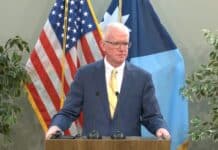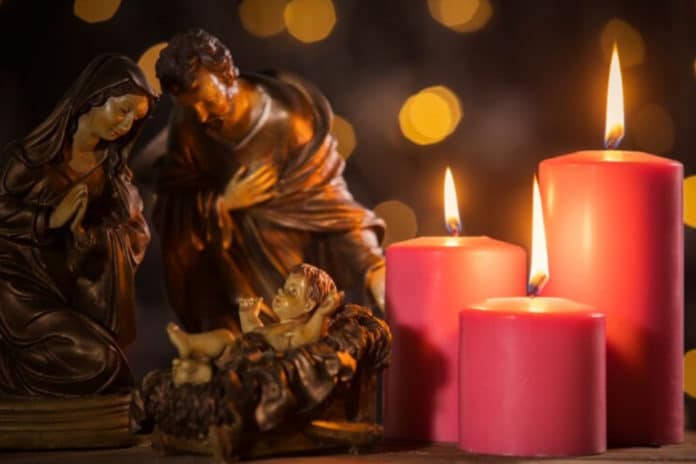(LifeSiteNews) — In three previous articles, we considered Advent’s liturgical texts, in which the Church calls again and again for her Lord to come to us — and in which she promises her children that He will arrive without delay. The excitement and restlessness only increases as Advent progresses, especially on Christmas Eve.
We considered how approaching this season with a focus on the “Parousia” — the second coming of Christ in glory — “trains” us (in the words of Father H.J. Coleridge) in a fearless longing for this triumph.
This, I argued, can in turn help us to face the encroaching secular tyranny and ecclesiastical chaos of our time.
It inculcates into us a real hope for a host of things that have not yet happened, but will: the final, triumphant glory of Christ; the vindication of his claims against his enemies in this world, and the exaltation of our Holy Mother, the Church.
So much for Advent — how does Christmas fit into this apocalyptic paradigm?
Christmas and history
There is no doubt that Christmas is commemorating a specific historical event. On three occasions in the liturgy, the Church proclaims the birth of Christ with reference to civil dates and rulers, making clear that our religion is based on a true and historical foundation — unlike the various myths of the pagans.
However, the liturgical writer Father Johannes Pinsk (whose treatment I am closely following) claims that every season and feast also refers, in a sense, to the final coming of Christ. If Advent is the season of longing for the Parousia, Christmas would be the commemoration of its arrival.
Indeed, the liturgy seems to treat this coming as being already here — both in the Church herself, and in her spouse’s will “to conquer the whole world and all [his] enemies, and thus to enter into the glory of [his] Father.”
Already the end times
We, the members of Christ’s body, continue his mission on earth — but our head, of course, has already entered into this glory. In this, we are already assured of the triumph, and are merely “cleaning up” the remaining skirmishes of the war. At any moment, the final decisive victory is to be won.
We naturally want Our Lord to reign over our hearts and our families — but we also want the public triumph of His Church, and for him to reign over society and the whole world. In other words, we want something ecclesial and public.
We want everyone — the shepherds and the kings — to come and adore him, and to recognize him in this mystical body.
Pope St. Leo the Great teaches us that Christmas fulfills the ecclesial reality of this longing, because “the birth of Christ is the source of life for Christian folk, and the birthday of the Head is the birthday of the body.” Baptism not only has us crucified, risen, and ascended with him, St. Leo tells us, but also born with him.
But more than just a birth, Christmas represents the other triumphs which St. Leo mentions. We also see this in his Christmas Matins sermon, which refers to our Lord’s birth as being the time “when our Lord entered the field of battle against the devil.”
Christmas is the celebration of that for which we have prepared in Advent — the public victory and reign of Christ, our King.
Certainly, this reign can be extended more and more, and we pray that each celebration of Christmas brings new graces to achieve this end and the conquering of the devil.
But Christ is already reigning now, and it is for this reason that the New Testament treats the post-Incarnation world as being a “new age” — or even, the last age, or end times. All events of history pointed to the Incarnation and Redemption, and we have nothing more to expect, except the working out of the campaign of our King.
Christmas as the feast of our coming and present victory
For this reason, Pinsk says (and it is a commonplace), Christmas cannot be limited to the commemoration of one historical event, but rather of the permanent reality of the mystery: the Incarnation itself.
The Incarnation is a permanent reality because Christ will never be separated from His human nature. The man, Jesus of Nazareth, is the Word Incarnate — the eternally begotten God the Son, sitting at the right hand of his Father. This is the same God-man who suffered, died, rose, ascended — and who will come to judge the living and the dead. And this glorious conqueror loves us with a human heart full of eternal, burning, and divine love.
And yet while we celebrate this triumph of Christ at Christmas, we know that the “consecration of the world” mentioned in the Martyrology is not a restoration of the Garden of Eden. Rather, it was and continues to be a campaign, a battle, a struggle.
Does this seem a far-fetched thing to be thinking about at Christmas? We have already seen that the texts of Advent give us a quite different — not to mention dramatic and thrilling — picture of the season than that to which we are accustomed. If we consider Christmas’ liturgical texts, we find the same spirit of combat which we have been discussing.
The Christmas liturgy and combat
Consider the very introit of the Midnight Mass — the first thing we hear in the liturgy:
“The Lord hath said to me: Thou art my son, this day have I begotten thee. Why have the Gentiles raged, and the people devised vain things?”
This is taken from Psalm 2, where we also see Christ laughing at his enemies, and mention of ruling “with a rod of iron” and a promise that he shall “break them in pieces like a potter’s vessel.” I repeat, this is the first thing sung at Christmas.
The Gradual of the same Mass is no less pugilistic and triumphant:
“With thee is the principality in the day of thy strength: in the brightness of the saints: from the womb before the day star I begot thee. The Lord said to my Lord: Sit thou at my right hand: Until I make thy enemies thy footstool.”
This continues throughout the Christmas period. Consider the Introit of the second Mass — which some commentaries would have us believe is focused on the shepherds, just because of the Gospel reading:
“A light shall shine upon this day: for the Lord is born to us: and He shall be called Wonder-Counselor, God-Hero, Father-Forever, Prince of Peace: of Whose reign there shall be no end.
The Lord is King, in splendor robed; robed is the Lord and girt about with strength.”
Consider also the Introit of the Sunday in the octave:
“While all things were in quiet silence, and the night was in the midst of her course, thy Almighty Word, O Lord, came down from thy royal throne.”
This is taken from the book of Wisdom, which continues immediately with the following:
“ … as a fierce conqueror into the midst of the land of destruction, with a sharp sword carrying thy unfeigned commandment, and he stood and filled all things with death, and standing on the earth, reached even to heaven.”
Open the liturgical books at random during this season, and we will not have to look far before finding similar texts — frequently insisting that this victory has arrived today.
We all love singing carols about the crib, and all the other lovely things about Christmas. Long may this continue — but let’s not lose sight of the spirit expressed in the Liturgy. The early Christians, Pinsk tells us, celebrated the historical events of Christ’s life — but always with their gaze turned towards the future. He writes:
“Christian piety of the first centuries feels like a chosen army, sure of its triumph and of its future victory … The Christians of the first centuries looked forward to the coming of the Lord as a future reality … Ancient piety aspired to the second coming of Christ, to his definitive triumph: ‘May the form of this world disappear and the glory of the Lord appear.'”
As we can see from the texts above, this spirit is infused into the Christmas liturgy.
All this should teach us to see fierce glory in this infant, and tender love in our redeemer, conqueror, king and judge.
This, perhaps, is what is meant when the Book of the Apocalypse talks of “the wrath of the Lamb.”
Conclusion
Throughout Advent we prayed for Christ to come and to deliver us from the powers of darkness, and to judge the living and the dead. On the very eve of Christmas the Church explicitly calls to mind the coming of the Judge:
“O God, You Who gladden us year after year with the expectation of our redemption, grant that we, who now welcome with joy Your only-begotten Son as our Redeemer, may also gaze upon Him without fear when He comes as our judge, our Lord Jesus Christ.”
This way of understanding the texts of Christmas — as well as Advent and Epiphany — is much needed today.
We are surrounded by encroaching tyranny and wicked men who wish to destroy us. Are these not the men mentioned in the Introit of Midnight Mass?
“Why have the Gentiles raged, and the people devised vain things? The kings of the earth stood up, and the princes met together, against the Lord, and against his Christ.”
And what is God’s response to these men, from the same psalm?
“He that dwelleth in heaven shall laugh at them: and the Lord shall deride them. Then shall he speak to them in his anger, and trouble them in his rage.”
It should give us great hope to know that even if we are destroyed, Christ has already won, and that his army and mystical body continues and will continue — until he triumphs once and for all.
As with Advent, this is by no means the only paradigm for approaching the great feast of the Nativity of the Lord — nor should it exclude the others taught to us by the great spiritual masters.
But we should also be taught by the holy Roman Liturgy. And this Roman liturgy teaches us the following, in the words of Father Pinsk:
“After the Incarnation, the fate of the prince of this world has been cast, even if he still has his role to play. He is in retreat. He can still mobilize his troops, but even his resistance and his very advances must lead him irremediably to his final ruin.
We can, therefore, celebrate with joy the feast of Christmas; through it Christ, ever living in the Church, brings her one step closer to her divinization, to that day when in all truth and reality ‘all flesh shall see the salvation of God.’ Then the Incarnation of the Son of God will no longer be the object only of the faith of ‘men of good will’ but will be the object of the vision of the whole universe.”











